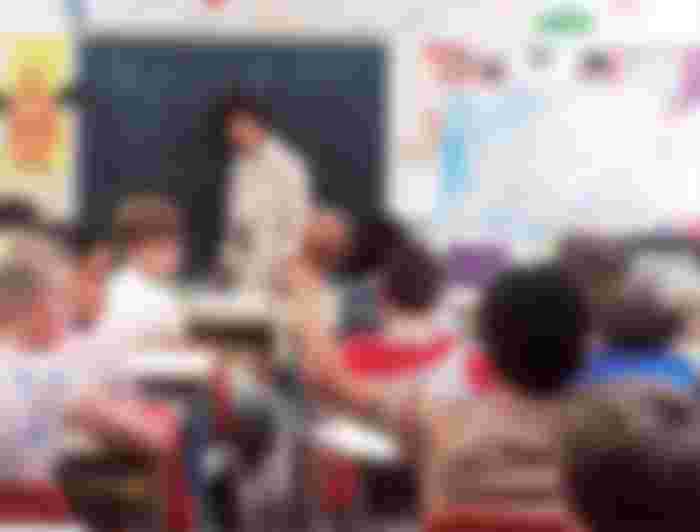Today, October 5, is World Teacher's Day, so let me join everyone who is paying tribute to teachers, educators, mentors, and whatever other term they go by as they forge on in a profession that is becoming more challenging by the day.
In the 8th grade, to my complete surprise, I was chosen to take over our Personality Development class during Student Teacher Week. You know that day, when a student stands in for the teacher and conducts class in their place, while Sir or Ma'am sits at the back to observe.
On one hand, I was glad the class assigned to me wasn't any of the major subjects like Math, Science or English, because that would've made me quite anxious. (Yes, I had fairly good grades in those subjects but was not confident enough to teach them). And I vaguely remember the topic for that day was just a continuation or reinforcement of what Mr. Espiritu (him of the blindfold exercise fame) discussed the previous session.
Did I seek him out to get some pointers? I can't recall. I do know I prepared for that class like I would for an exam, including feeling the jitters until I finally stood in front of the class. Guess what? If it were I test, I aced it! Mr. Espiritu said so himself. And in fairness to my classmates, they did give me an encouraging round of applause for a job well done (I did make sure it would also be fun).
So would I have wanted to be an educator? While it was never among the things I aspired for as a young student, later on I realized it was something I could've been good at had I chosen to pursue the path.
Family of teachers
On both sides of my family, there are teachers. My paternal grandparents were both teachers - he in high school, she in grade school. My father's only sister also took up education and even went on to become a principal before her application to migrate to America came through.
My maternal grandmother was also a teacher for some time, as were her youngest brother, and two eldest daughters.
All of them I knew to be dedicated to the profession, and except for my paternal aunt, who went up the ranks to an administrative position, stayed on in the classroom until their retirement.
My eldest cousin on my father's side and her sister also became teachers. So, it does run in the family. And as I grew older we would have these discussions about the state of education and how it would be nice to set up a school where we could teach differently yet still make an impact.
How education has changed
Many years ago, learning wasn't as complicated as it is now. There were the basics - English, Math, Science, Social Studies, Filipino, Good Manners and Right Conduct, Music, Arts, and Physical Education.
The tools were a chalk and blackboard, pad paper, pencil or pen, and notebook plus the textbooks. Knowing how to write legibly and neatly was a thing, and teacher went around with ruler in hand to lightly whack our writing hand if we did badly.

We had quizzes and assignments, and quarterly exams plus projects. Perhaps I am lacking in knowledge about how it was in public schools because I went to private institutions. But my older relatives were all teaching in public schools and they were always proud of their pupils, even the notorious and problematic ones, because they would end the school year with mostly passing grades. (Those who really couldn't cope would have to repeat the grade level the following year).
But unlike today when the policy of the Department of Education is to pass students across-the-board, it was more realistic because there was always effort on the part of teacher, student and parents to see that the child did end up actually learning and not just attending class.
Dedication and commitment
The teachers I grew up with were not necessarily strict or lenient but they were dedicated in their mission not only to educate us children but to help mold their pupils into people with integrity, aspirations, and confidence to be the best they can be.
Teaching was a noble profession then. It should still be. But why does it feel that many of the younger mentors today don't have their heart in being a real educator?
Yes, educating the young nowadays is more complex, with the need to adapt to technological advancements and subject matter that has developed over time. And a dizzying increase in the number of pupils every school year, particularly in public schools, makes it twice as difficult to teach.
Of course, there too is the fact that children today are raised more liberally, and often lacking in basic values like discipline, respect, obedience, initiative, and even curiosity that has nothing to do with gadgets or the Internet.
So it is understandable why teachers are stressed out, especially when they have to handle multiple classes every day. It does not help that students today are expected to take in so much information in such an abbreviated period that learning no longer brings joy and excitement.
Add to that the salaries that teachers receive for the work and sacrifice they render. While public school teachers are better off than most of their private school counterparts (except for exclusive schools that charge exorbitant fees and can therefore afford to be more generous to their teachers) when they have to spend out-of-pocket to supplement teaching materials, the actual pay that they end up with doesn't really amount to much.

Advocate for kids
Perhaps this is the reason why many public school teachers are after moving up in rank and landing administrative positions instead of actually utilizing their knowledge and skills in the classroom.
And it is disheartening to see many younger educators today so consumed with playing politics instead of focusing on what their students actually need and ways to address the many concerns in the classroom setting that will ultimately lead to better outcomes. They have forgotten that among their responsibilities is to advocate for their students.
I wish more teachers were open to communicating with their students, even reaching out to them, instead of dismissing their concerns. Students shouldn't have to feel afraid asking teacher to clarify or expound on assignments or requirements, or seek help when they have difficulty understanding lessons and concepts.
They have to stop taking it out on a student if a complaint is raised, when the issue is actually vital to a learner's ability to cope or do better in a particular subject.
While remuneration is an important consideration when pursuing a career, passion is equally important especially when the profession or occupation is vital to the development of human beings.
Important role
Schools aren't churning out products or goods. Its role is to teach, guide, and mold young minds so they are equipped with knowledge and skills that are tools to improve lives and find success in an individual's future chosen endeavors.
This task falls on the shoulders of teachers. It is a heavy burden to bear, one that requires more than a college degree and professional license. It will demand mind, body and soul. And unless that teacher truly has it in his or her heart to keep at the job, it is the students who will always end up shortchanged.
Times are different. Times are difficult. And there will be more challenges. But a teacher who is committed, who is dedicated, will forge on, will never give up and never forget that teaching is the noblest of professions.
To the ones who hold their profession so dear and go above and beyond their duty, I salute you and my heartfelt gratitude.
And to the mentors who have inspired me most - Mrs. Rada, Mrs. Flores, Ms. Hermosa - I will forever hold you dear in my heart.
Images from Unsplash


My profession as a psychopedagogue led me in many years of my career to the classroom care of children and adolescents with mental retardation. After many years I started in andragogic education, in universities. Truly, being an educator is a noble career.